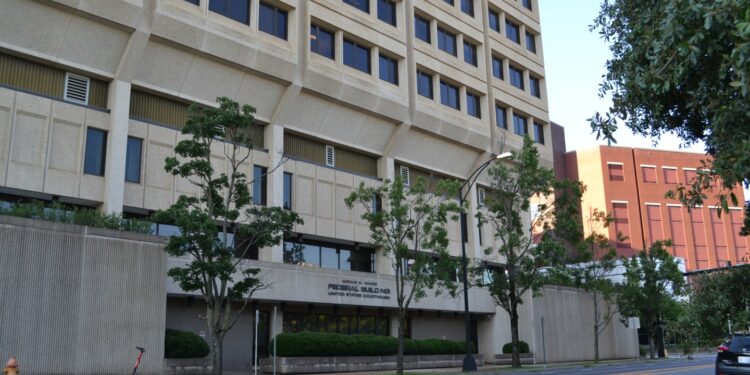June 13, 2025 Story by: Publisher
A federal trial will commence Monday in Winston‑Salem, as a three-judge panel hears consolidated lawsuits challenging North Carolina’s 2023 congressional and state legislative district maps.
Plaintiffs, including the North Carolina State Conference of the NAACP, Common Cause, and several individual voters, contend the districts amount to unconstitutional racial gerrymanders, violating the Equal Protection Clause and Section 2 of the Voting Rights Act.
In one case, plaintiffs led by the NAACP and Common Cause challenged maps lawmakers drew in 2023 for state House and Senate elections, along with the 14-district congressional map.
The NAACP suit alleges that lawmakers “unlawfully racially gerrymandered SD8, … in violation of the Fourteenth Amendment” and “Intentionally diluted Black voting power in violation of VRA Section 2 … and the Fourteenth and Fifteenth Amendments … in challenged Senate Districts.”
A three-judge panel has struck down challenges to more than 20 legislative and congressional districts in two consolidated federal redistricting lawsuits. The panel also rejected claims that North Carolina election maps include too many or too few voters in some challenged districts.
A court order in April granted requests from Republican legislative leaders to have portions of the two lawsuits dismissed. Judges allowed election map critics to continue to pursue claims challenging other districts.
What’s at Stake
- Voting power dilution claims: The judges will hear testimony about congressional districts 12 and 14 in Mecklenburg and counties west, about state Senate districts 1 and 2, which divide eastern North Carolina’s Black Belt counties, and about state Senate District 8, which is dominated by Columbus and Brunswick counties, with a few Black neighborhoods in Wilmington added for 2024.
- Maps already in use: Though judges allowed these maps to stand during the 2024 election cycle, a successful challenge could force North Carolina lawmakers to redraw them ahead of the 2026 elections.
Judicial Panel Overview
The case will be heard by:
- Judge Allison Jones Rushing, a 4th Circuit appellate judge
- Judge Richard Myers, U.S. District Court
- Judge Thomas Schroeder, U.S. District Court
All three were appointed by Republican presidents. The panel is overseeing consolidated claims from the cases Williams v. Hall and NC State Conference of NAACP v. Berger.
Plaintiffs’ Argument: Systemic Racial Gerrymandering
- Legal framework: Plaintiffs aim to prove, by a “preponderance of the evidence,” that race was the predominant factor in map drawing—breaching both the Voting Rights Act (Section 2) and the Constitution’s Fourteenth and Fifteenth Amendments.
- Targeted districts: They highlight dilution in Senate Districts 1 & 2, charging unlawful packing of Black voters, and contend similar manipulation occurred in congressional districts designed to suppress Black electoral influence.
Evidence Dynamics
- What’s included: Expect fact testimonies, demographic analyses, expert witness presentations (plaintiffs and defense), and internal legislative drafting records.
- What’s absent: Unlike previous mapping trials in the state, no current lawmakers will testify. That omission may limit the direct attribution of motive in district design.
Trial Logistics
- Begins: Monday morning, June 16, 2025
- Panel: Three-judge federal court in Winston‑Salem
Broader Context
- Political landscape: North Carolina’s maps reflect a governing Republican super-majority: 10-4 in the U.S. House delegation, 71-49, and 30-20 in the state House and Senate.
- National relevance: This trial echoes redistricting battles unfolding across states (e.g. Alabama, Louisiana, Georgia), reinforcing judicial influence in whether racially motivated map drawing crosses constitutional thresholds.
Bottom Line
Next week’s trial will test whether North Carolina’s post-2020 maps illegally diluted Black voting strength or legally followed demographic and geographic principles. A ruling could reshape political representation in the state and inform redistricting jurisprudence nationally.
Source: Carolina Journal

















